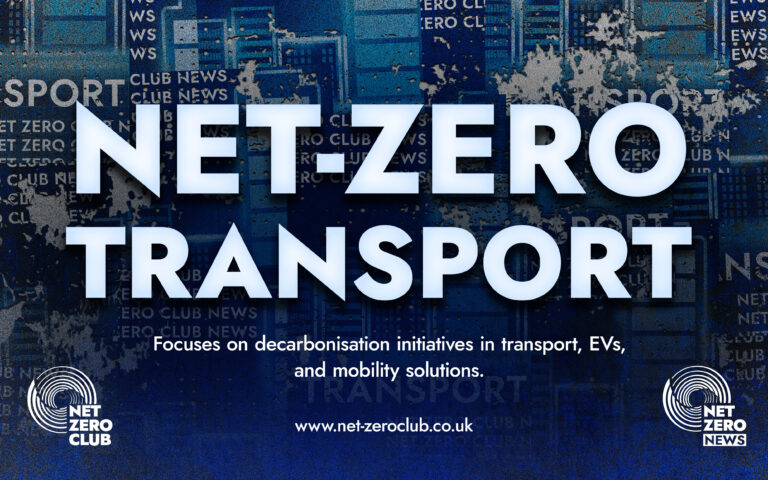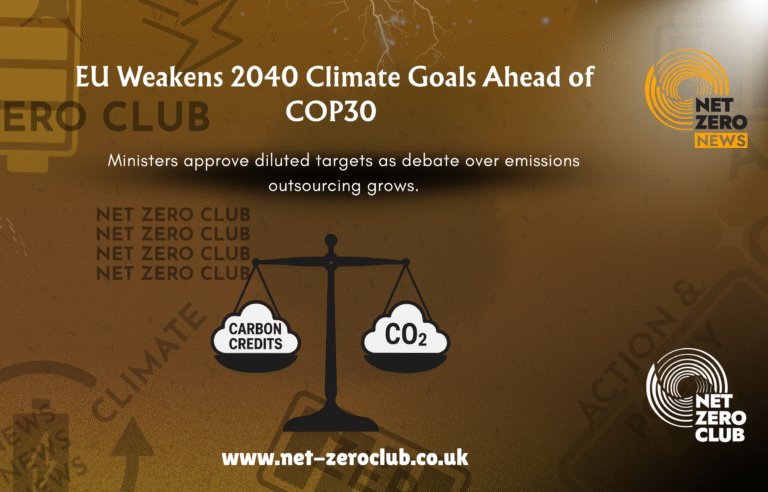Exclusive Interview: Ofgem CEO Jonathan Brearley on Energy Future

Welcome, Net Zero News readers,
In a rapidly changing energy landscape, Jonathan Brearley stands at the helm of Ofgem, the UK’s energy regulator, steering the organisation through unprecedented challenges. Since his appointment as chief executive in 2020, Brearley has navigated the tumultuous waters of the Covid-19 pandemic, the geopolitical repercussions of Russia’s war in Ukraine, and the resulting energy crisis that has reshaped the UK’s energy market. Recently, it was announced that Brearley will continue in his role until 2030, coinciding with the UK’s ambitious target for its electricity system to operate entirely on clean power. This extended tenure places him in a pivotal position to oversee the transformation of the country’s electricity and gas networks, as well as the energy markets, retailers, and consumer prices during this time of dramatic transition.
In a candid interview with Carbon Brief, Brearley shared insights on the future of the energy network, the concept of “zonal” pricing, the lessons learned from international incidents like the Spanish blackout, and the measures Ofgem is taking to protect consumers from soaring energy prices. Let’s delve into his thoughts on the evolving energy landscape and the path toward a sustainable future.
The Energy System in a Decade
When asked about the future of the UK’s energy system a decade from now, Brearley offered an optimistic perspective. “If you fast forward to 10 years’ time, our energy will come from various different sources,” he remarked. He envisions a landscape where homes are equipped with solar panels, electric vehicles not only serve as modes of transport but also contribute to energy management within households, and families actively engage with their energy consumption in ways that are currently difficult to imagine.
Brearley emphasised the importance of ensuring that this transition benefits all consumers. “The benefits could be really significant,” he stated, highlighting the potential for reduced energy costs and increased energy independence. However, he acknowledged the need for careful planning and execution to ensure that the transition is smooth and equitable for all.
The Need for Faster Network Rollout
Reflecting on the past few years, Brearley admitted, “We should have built the network faster.” The urgency of developing the infrastructure to support the growing demand for renewable energy sources has become increasingly clear. He noted that while there has been a focus on renewable generation, the networks required to deliver this energy need equal attention. Ofgem has been working to accelerate the rollout of the network to keep pace with the evolving energy landscape.
“We have a huge task now to get our networks in place,” Brearley explained. “In a system where the place we generate is going to change, we need the network to match.” This emphasis on rapid development aligns with Ofgem’s strategic initiatives aimed at ensuring that the country’s energy infrastructure is equipped to handle the shift toward renewable generation.
Changing Scope of Ofgem
The scope of Ofgem has evolved significantly in recent years, particularly in light of the energy crisis. Brearley reflected on how much Ofgem’s focus has shifted since he took over in 2020: “I don’t think I’d have imagined how fast we would change the things that we do.” The regulator has had to adapt its approach to price controls and regulatory measures, prioritising the speed of investment in infrastructure as a means of protecting consumers.
Brearley highlighted Ofgem’s new initiatives, such as the Accelerated Strategic Transmission Investment (ASTI) programme, designed to ensure that regulatory processes do not hinder project development. The upcoming Revenue = Incentives + Innovation + Outputs (RIIO) framework aims to further facilitate necessary investments in infrastructure while maintaining a focus on delivering value to consumers.
The Debate on Zonal Pricing
One of the more contentious topics in the energy sector is the potential shift to zonal pricing, a move Brearley supports. He explained that the debate around pricing structures is complex and nuanced, with economic benefits to single pricing but also uncertainties that could impact capital costs. “It’s a balanced judgment,” he stated, acknowledging that the transition to zonal pricing is not a straightforward decision.
Brearley believes that while zonal pricing could enhance system efficiency and adaptability, the timeline for implementation must be carefully considered to avoid jeopardising the government’s clean power goals by 2030. The interaction between pricing structures and capital costs is a crucial consideration in this debate.
Protecting Consumers Amidst Volatility
In the face of ongoing energy price volatility, Brearley reaffirmed Ofgem’s commitment to protecting consumers. He pointed out that the UK’s reliance on an international gas market, especially in light of the recent geopolitical events, has underscored the need for a more resilient energy system. “We want to build a system where we never face that kind of situation again,” he said.
By investing in infrastructure and diversifying energy sources, Ofgem aims to create a more stable system that is less susceptible to external shocks. Brearley noted that early analyses suggest that by 2030, with a robust network in place, the UK would be better positioned to weather future crises.
Learning from International Incidents
The recent blackout in Spain serves as a cautionary tale for energy regulators worldwide. Brearley expressed the importance of learning from such incidents to enhance resilience in the UK system. “We’ll all have to be vigilant,” he cautioned, emphasising the need for ongoing scrutiny and improvement in energy management.
While he acknowledged that the UK’s isolated grid presents unique challenges, he believes there are valuable lessons to be learned from other countries, particularly in terms of interconnection and the management of renewable energy sources. “We’re going to build out up to around 18 gigawatts of interconnection,” Brearley stated, indicating that the UK is headed towards a more interconnected energy future.
Facilitating the Transition to Zero-Carbon Power
As the UK approaches a future with greater reliance on zero-carbon electricity generation, Brearley identified several challenges that Ofgem must address. “The job for all of us is to be really careful about the security of supply,” he stressed. This focus on supply security must remain paramount as the energy landscape evolves.
He also noted that the transition must be economically viable for consumers. “We need to think about how to rebalance energy-bill policy costs,” he said, recognising the importance of addressing the distributional consequences of any changes made to the energy system.
Equity in the Energy Transition
Brearley acknowledged the significant challenge of ensuring that all consumers, particularly those from lower-income backgrounds, are included in the energy transition. He emphasised the need for innovative solutions to make energy-efficient technologies accessible to all. “There’s a really big challenge for all of us about how we’re going to get some of this kit into people’s homes,” he stated, highlighting the importance of equitable access to the benefits of the energy transition.
In response to these challenges, Ofgem is exploring initiatives like the “warm homes plan,” which aims to support vulnerable customers in accessing energy-efficient technologies. Brearley is optimistic that these efforts will foster greater engagement from all consumers, dispelling the myth that lower-income households are disinterested in participating in the energy market.
Addressing Misinformation and Enhancing Awareness
As the debate around net-zero intensifies, Brearley noted the importance of combating misinformation surrounding energy issues. “We see part of our job as being that sort of authoritative voice,” he stated, emphasising the need for accurate information grounded in evidence.
He acknowledged that greater awareness of energy bills has emerged since the onset of the energy crisis, leading to increased consumer engagement and scrutiny of energy providers. Brearley’s initiative of personally calling customers to gather feedback reflects Ofgem’s commitment to understanding consumer concerns and fostering transparency.
Looking Ahead: Ofgem’s Future Focus
As Ofgem prepares to unveil the RIIO framework, Brearley expressed a sense of urgency in unlocking the necessary investments to build the future energy system. “We need to unlock the money as those projects progress,” he stated, highlighting the collaborative effort required from regulators, industry, and government to ensure timely implementation.
Brearley concluded the interview by emphasising the importance of public discourse around the energy transition. “We need to have a really interesting discussion about how customers are going to see this change,” he remarked, encouraging dialogue about the shape of services and the benefits of new technologies.
As the UK charts its course towards a cleaner, more sustainable energy future, Brearley’s leadership at Ofgem will be crucial in navigating the complexities of this transformative period. With a focus on infrastructure, consumer protection, and equitable access, the path ahead promises to be both challenging and rewarding.
Stay tuned to Net Zero News for more updates on energy policy and the journey towards a sustainable future!

 Got net-zero news, project updates, or product launches to share?
Got net-zero news, project updates, or product launches to share? 

